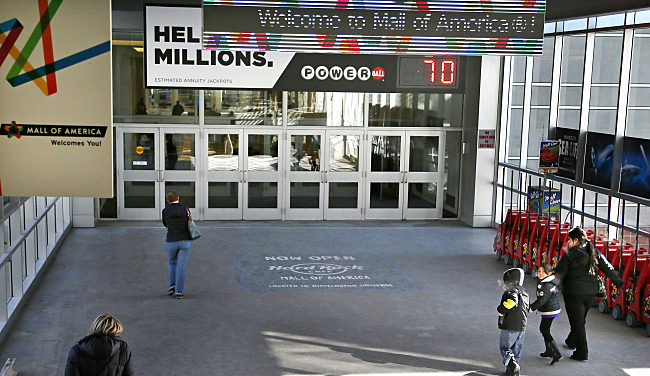A video purportedly made by Somali terror group al-Shabab urging attacks on U.S. shopping malls, including the Mall of America, was quickly denounced Monday by Somali-American leaders in the Twin Cities.
Community leaders condemned the video "in the strongest possible terms," said Mohamud Noor, executive director of the Confederation of Somali Community in Minnesota.
Noor said the militant group wants to create fear and remain relevant since it has lost ground to Somali and African Union forces.
"Al-Shabab group has been reduced to a small core of individuals," he said. "They have lost the bigger fight and for them to remain legitimate they have to create more chaos and confusion."
The 75-minute video, released online, largely focuses on the group's dispute with the country of Kenya. Although its mention of malls alarmed some shoppers, only a minute or so of the video advocates for terror attacks in the United States, United Kingdom and Canada.
"It almost looks like what they were trying to do is salvage this very long and un-watchable video by putting something in that attracts a lot of media attention," said Ken Menkhaus, a political science professor at Davidson College in North Carolina. "They succeeded."
There has been intense scrutiny of the threat in the United States, particularly after Homeland Security Secretary Jeh Johnson warned Mall of America shoppers Sunday to be "particularly careful."
Menkhaus, who studies the Horn of Africa, said the video could be a ploy by al-Shabab to regain international attention as other terror networks, like the group calling itself the Islamic State, have gained traction.

While so-called lone-wolf attacks can be difficult to predict, Menkhaus said al-Shabab has not been effective in calling for them in the past.
In May, it released a video in English that called for supporters to carry out a "lone-wolf mission" and to attack like "the brothers in Westgate Mall." The video included a mock-up of an airplane boarding pass showing Minnesota as the point of origin and the slogan, "Next flight to Mogadishu: The only one missing is you."
Intelligence services seem to have vastly improved their information-sharing abilities in recent years, said Edward Turzanski, a Templeton Fellow at the Foreign Policy Research Institute and a scholar in residence at LaSalle University.
But the success that some radical groups have had in signing up recruits from communities in Europe and the United States points to one possible danger.
"More and more you have people who are being radicalized online and are finding a path towards connectivity to a terror organization," Turzanski said. "This is a phenomenon that keeps on changing; it's a bit of a shape-shifter."
The Mall of America fits the profile for groups like al-Qaida, which Turzanski said has traditionally focused on targets with "great symbolic, systematic and practical value."
Turzanski and Menkhaus both said authorities need to be aware of the possibility of attacks without overreacting.
"One of the ways that al-Shabab and other groups can win a battle without having to pull the trigger is to incite us to act in ways that make our lives miserable and alienate our fellow Muslim citizens," Menkhaus said.
Law enforcement and Mall of America officials said there is no evidence of a credible threat against the mall. But there are additional security measures in place there. A spokesperson for the Mall of America said attendance levels didn't appear to be affected by news of the video over the weekend.
Since late Saturday, leaders of Minnesota's Somali community have met several times to find a way to respond to the threats, said Jaylani Hussein, executive director of the Minnesota chapter of the Council on American-Islamic Relations.
"We must not allow terror groups like al-Shabab to achieve its goal of spreading fear or panic in our community," Hussein said. "We must also prevent justifiable security concerns from being used as a pretext to promote hatred, prejudice and suspicion of the whole community."
Noor, of the Confederation of Somali Community in Minnesota, said the terror organization has lost its ability to lure young Somali-Americans to its ranks.
"We don't have any evidence or knowledge of people who have been recruited by al-Shabab for many years now, and I think that is a good news and people are becoming more resilient fighting extremism at all level," he said. "I don't believe this video will attract a group of followers who support al-Shabab."
No comments:
Post a Comment